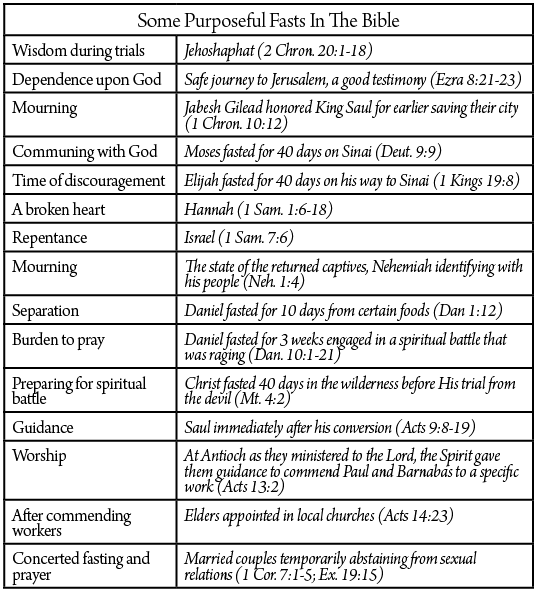Fasting denotes abstaining from food for a period of time. The only time God commanded fasting was during the annual Day of Atonement when Israel was told to afflict their souls, neither eating nor working (Lev. 16:29-31; 23:26-32; Num. 29:7). It was a time of solemn reflection and repentance. In Acts 27:9, this Feast of Jehovah is referred to as “the Fast.”
During their seventy-year captivity Judah instituted fasts to mourn four calamitous events: the siege of Jerusalem on the 10th day of the 10th month (2 Ki. 25:1; Jer. 52:4), the capture of Jerusalem on the 17th day of the 4th month (Jer. 52:6-7; 2 Ki. 25:3), the destruction of Jerusalem and the burning of the temple on the 9th day of the 5th month (2 Ki. 25:8-10), and Governor Gedaliah’s assassination at Mizpah on the 3rd day of the 7th month (Jer. 41:4; 2 Ki. 25:25) 1.
After Judah’s return from captivity, men from Bethel (Zech. 7:2) came inquiring whether these fasts should continue. God responded by asking whether these fasts were for Him or for themselves (Zech. 7:4-5). Indifferent to ritualistic fasting, the Lord desired their obedience, mercy towards others, and righteous living (Zech. 7:7-14; 8:16-19).
In the Gospels, the Pharisees fasted every Monday and Thursday2 (Mt. 9:14-15, Lk. 18:12). Questioning their motives, the Lord criticized them for drawing attention to themselves (Mt. 6:16-18). Conversely, the widow Anna continually served God with fasting and prayer, watching for the coming Messiah (Lk. 2:36-38).
A spiritual discipline, fasting should always be combined with prayer (Ezra 8:23; Acts 9:9-11; 14:23), a heartfelt exercise of individuals or small gatherings (Acts 13:1-2). Fasting should never be imposed, as formalized fasts have the potential for self-deception, disguising one’s true spiritual condition.
We should never fast in an effort to gain God’s approval (Isa. 58:1-7). Nor should one employ it in rebellion, attempting to avoid or resist His chastening (Jer. 14:12; Heb. 12:5-11). Nor yet should we practice fasting to punish ourselves as penance is never taught in scripture.
The motivation behind fasting must always be closer fellowship with Christ, seeking His direction for specific or general matters. Genuine fasting helps one focus upon Him, sharpening our spiritual acuity (2 Chron. 20:3-12; Acts 13:2). It blocks out distractions, helping one engage in fervent, concentrated and unhindered prayer.
God does not command us to fast. A personal choice, some believers choose to, while many do not. Ultimately, fasting serves its purpose only if it leads to greater intimacy with Christ because God wants us to “rend our hearts, and not our garments” (Joel 2:12-13).
Endnotes:
1. Merrill F. Unger, The New Unger’s Bible Dictionary (Chicago, IL: Moody Press, 1988), p. 401
2. Alfred Edersheim, The Life and Times of Jesus the Messiah (Peabody, MA: Hendrickson Publishers Inc., 1993), p. 676


